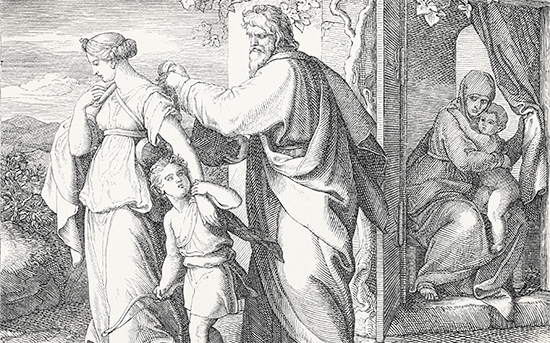
October-
November 2016
Moving Forward
------------------
|






INTERSECT: Reflections on Hagar and Ishmael, Part One
Lately, I have been reading through Genesis in my personal Bible reading. As I read the story of Hagar and Ishmael once again,
I was captured by the raw emotion of the story. Thankfully, this episode does not leave us in the swirl of conflicting emotions, but moves us along to see the grace of God at work. The difficult circumstances Hagar and Ishmael faced compel us to consider their importance for the church today.
Our Sinful Choices Deeply Affect Others
Most Christians are familiar with the story of Abraham, Sarah, and Hagar. Hagar was the Egyptian maidservant of Sarah, Abraham’s wife. God had promised Abraham he would become a great nation, inherit a land, and become a blessing to the nations (Genesis 12:1-3, 7; 13:14-17; 15:1-7, 18-21). The obvious problem was that Sarah was barren (Genesis 11:30). Not only were she and Abraham childless, they were beyond childbearing age. The Bible tells us Abraham was 86 years old when Hagar gave birth to Ishmael (Genesis 16:16) and age 99 when the Lord appeared to him again in Genesis 17:1. Sarah was still without a child.
How does Hagar fit into this story? Although Abraham and Sarah knew God’s promise, they began to doubt the longer it went unfulfilled. Sarah devised a plan. Abraham would take her maidservant Hagar as a second wife, and she would bear him a son. She thought perhaps this was how God would produce an heir for Abraham’s household (Genesis 16:2-3). In Genesis 15, Abraham had already suggested that Eliezer, born to one of Abraham’s household servants, would be his heir, since God had not yet produced an heir through Sarah. On the contrary, God reiterated His promise: “This one shall not be your heir, but one who will come from your own body shall be your heir” (Genesis 15:4).
Sarah’s plan was a way of “getting around” the problem of barrenness. If Abraham took a second wife who wasn’t barren, he could father a legitimate heir. Hagar became the pawn of Sarah’s scheme; she used her for personal gain. But things didn’t work out exactly as Sarah envisioned. After the birth of Ishmael, Hagar looked down upon her mistress for her inability to bear children, and Sarah despised her handmaid because the family dynamics had tilted in Hagar’s favor. Hagar suffered because Sarah and Abraham failed to wait patiently on the Lord. Taking a second wife violated the law of God instituted in the one-flesh union of husband and wife in Genesis 2:24. Although polygamous relationships are recorded in the Bible, their disastrous results are also on full display. The story of Hagar is no exception.
Much like Adam when he shared the fruit with his wife Eve, Abraham complied with Sarah’s ungodly plan. He was no passive bystander, however, and God held him responsible for the entire affair. He rebuked Abraham saying, “I am Almighty God; walk before me and be blameless” (Genesis 17:1).
Abraham’s conduct had been anything but blameless. Not only had he violated God’s plan for marriage, he also sinned against Hagar. To make matters worse, he brought an innocent child named Ishmael into a tenuous family dynamic. And beyond his immediate failure, the ramifications created by this dysfunctional family would shape forever the course of world history.
Yet God remained faithful. He kept his promise despite Sarah’s scheming, Abraham’s moral failure, and Hagar’s haughty reaction to her mistress. In the December-January issue, we will return to this story and explore God’s grace and healing for this family and the implications this story holds for today.
About the Writer: Matthew McAffee is coordinator of Theological Studies at Welch College. He earned a Bachelor of Arts degree at Welch College, Master’s degrees from Southern Baptist Theological Seminary and University of Chicago, and a Ph.D. from University of Chicago.
|
|

